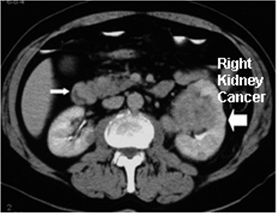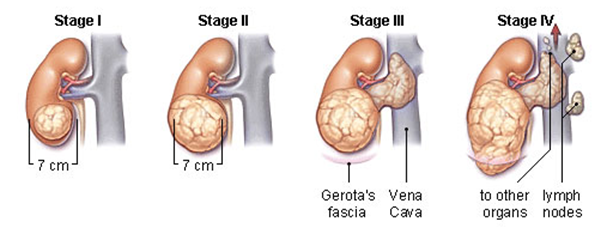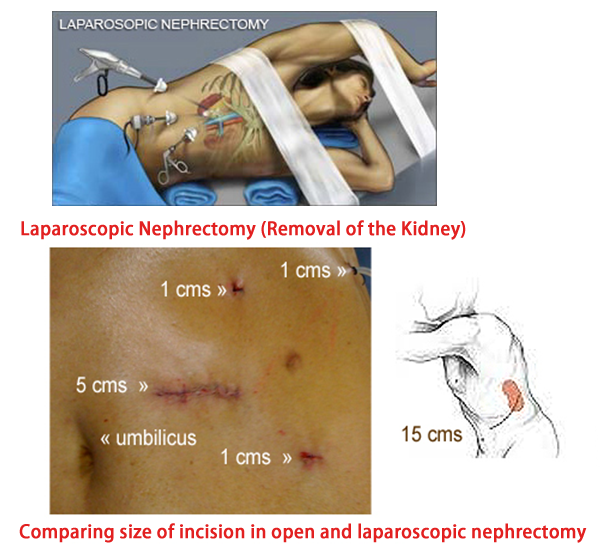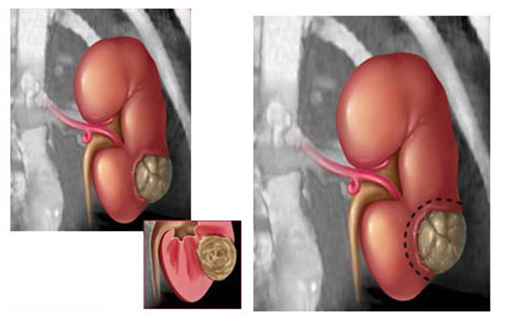URINARY CANCERKidney Cancer account for 2 to 4%. About Cancers Cancer cells in tumors are abnormal and divide without control or order. These cancer cells can invade and destroy the tissues around them. Also, cancer cells can break away from a malignant tumor and enter the bloodstream or the lymphatic system. This process is the way cancer spreads from the original (primary) tumor to form new tumors in other parts of the body. 
Kidney Cancer 
Renal is the Latin word for kidney. Renal cell cancer is the most common type of kidney cancer, and occurs more often in men than in women. Like all cancers, renal cell cancer begins small and grows larger over time. Although renal cell cancer usually grows as a single mass within the kidney, a kidney may contain more than one tumor, or tumors may be found in both kidneys at the same time. Some renal cell cancers are noticed only after they have become quite large, but most are found before they metastasize (spread) to other organs through the bloodstream or lymph vessels. Symptoms of Kidney Cancer Due to the deep location of the kidneys, there may not be any symptoms until the tumor has grown quite large. The most common symptom is blood in the urine (hematuria). Other symptoms of kidney cancer may include:
Detection & Diagnosis Small and early stage renal cell carcinomas are commonly diagnosed incidentally by routine ultrasound and CT scans done for other unrelated symptoms and health problems. Larger renal cell carcinomas usually present with symptoms. There are several tests used to detect and stage kidney cancer.
These are ultrasound, intravenous pyelogram (IVP), CT scan and MRI scan. CT of the kidneys involve injecting a dye into the blood streams during the scanning. Kidney cancer will enhance (or light up brilliantly) while other pathology like renal cyst will not enhance. This is the best imaging modality. These CT scan is used to stage the disease as well. In patients with poorly functioning kidney or has allergies to contrast (dye), MRI is done instead. Treatment Kidney cancers are not responsive to radiations or Chemotheraphy. Nephrectomy 
Note:At Apollo hospitals, Chennai, Dr. K. Ramesh does laparoscopic nephrectomy as firstline treatment for small tumors and non-functioning kidneys. Partial Nephrectomy Partial nephrectomy or nephron-sparing surgery(NSS) is an effective treatment for selected kidney cancers. The procedure can be laproscopic or open. Laproscopic partial nephrectomy is one of the complex laproscopic procedures in urology. Recently Dr.Ramesh has performed his first laproscopic partial nephrectomy at Apollo Hospitals,Chennai for 6cm renal tumor as renal preservation surgery. Indications

Prostate cancer is second most common cause of cancer related death in men next to lung cancer according to world literature.Though incidence of prostate cancer is reported to be less, common in Asians there is no data to confirm this. The death rate from prostate cancer has decreased nearly 10% over past 15 years and indirect evidence for positive impact of screening strategies. Prostate cancer occurs when cells in the prostate grow and multiply uncontrollably. The nodular tumour mass invades the surrounding tissues and eventually spread to the lymph nodes, skeletal bones and other regions of the body. The most common cancer in American men. Early Detection Your best chance for surviving prostate cancer is detecting it early. When prostate cancer is found early and treated appropriately, there is more than 90% chance for cure. Symptoms Early prostate cancer often have no symptoms. If symptoms are present, they vary from man to man, and may include:
Many of these symptoms are not cancer, but if you notice one or more of them for more than two weeks, see your doctor. Risk Factors Many factors may influence the development of prostate cancer, including:

Treatment Surgery and Radiation are the two options available for the treatment of early prostate cancer. |

+91 - 95661 39630
+91 - 94441 68963



